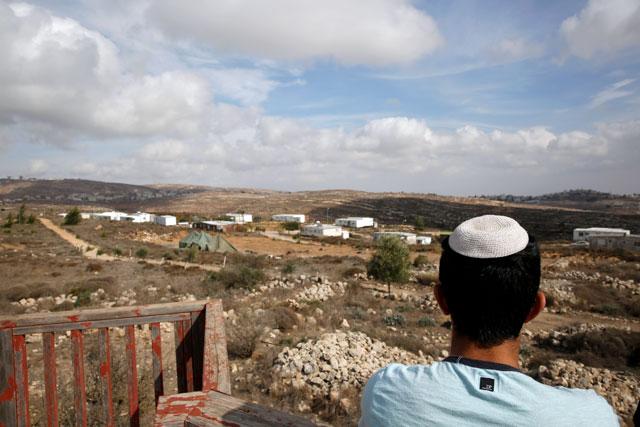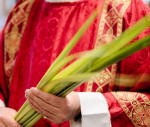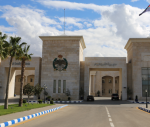You are here
Israeli far right hails bill to legalise settler housing units
By AFP - Dec 06,2016 - Last updated at Dec 06,2016
OCCUPIED JERUSALEM — Israeli far-right politicians on Tuesday welcomed initial approval of a bill to legalise some 4,000 settler housing units in the West Bank, calling it a step towards annexation of most of the Palestinian territory.
The bill was given preliminary approval by parliament late on Monday despite a chorus of international criticism that it was an illegal land grab with dangerous implications for Middle East peace.
The bill must pass three more votes in parliament before it becomes law, with the first likely to be held on Wednesday.
Preliminary approval had been expected following an agreement between Prime Minister Benjamin Netanyahu and a right-wing rival, though Attorney General Avichai Mandelblit has said he will not be able to defend it before the courts.
The bill has severely tested Netanyahu's coalition, seen as the most right-wing in Israeli history.
Strong supporters of the bill, including those who outright oppose a Palestinian state, rejoiced in the initial vote and said they hoped it could lead to eventual Israeli annexation of most of the occupied West Bank.
The bill's main backer, Education Minister Naftali Bennett, said Israel should tell its international allies that it was in the West Bank to stay.
An agreement between Netanyahu and Bennett has allowed the bill to move forward.
"It's time to say: 'Friends, we plan on staying in Maale Adumim, the Jordan Valley and Ofra and Ariel forever, because this is our land'," he told army radio, naming settlement areas, some of them deep inside the West Bank.
Bennett has advocated annexing most of the territory, like other Israeli religious nationalists who point to “the Jewish connection to the land from biblical times”.
“With this law, the state of Israel has moved from the path leading to the creation of a Palestinian state to the path leading to [Israeli] sovereignty” over most of the West Bank, Bennett said on Monday.
Others from his party voiced similar sentiments, with Justice Minister Ayelet Shaked saying the bill was “deepening our hold on our beloved land”.
Netanyahu says he still supports a two-state solution to the decades-old Israeli-Palestinian conflict.
‘Most dangerous law’
The international community considers all settlements in the West Bank, including Israeli-occupied East Jerusalem, to be illegal, whether they are authorised by the government or not.
The Israeli government distinguishes between those it has approved and those it has not.
The UN envoy for the Middle East peace process, Nickolay Mladenov, warned of the bill’s implications.
He said it “has the objective of protecting illegal settlements and outposts built on private Palestinian property in the West Bank”.
“If adopted, it will have far-reaching legal consequences for Israel, across the occupied West Bank and will greatly diminish the prospect of Arab-Israeli peace,” Mladenov said.
Walid Assaf, the Palestinian minister responsible for monitoring Israeli settlements, called the bill “the most dangerous law issued by Israel since 1967”.
Israel occupied the West Bank in the Six-Day War of 1967 and subsequently annexed East Jerusalem in a move never recognised by the international community.
Speaking on Sunday, US Secretary of State John Kerry accused right-wing Israelis of deliberately thwarting efforts to broker a peace deal.
He said “more than 50 per cent of the ministers in the current government have publicly stated they are opposed to a Palestinian state and that there will be no Palestinian state”.
The agreement that has led to the bill moving forward saw a wildcat Jewish outpost in the West Bank, known as Amona, removed from its provisions.
Amona, where around 40 settler families live, is under a court order to be evacuated by December 25 since it was built on Palestinian land.
Some members of Netanyahu’s coalition said they could not support the bill if Amona remained part of it because of the court ruling against it.
The agreement will instead see Amona residents temporarily moved to nearby land that Israeli officials describe as abandoned.
Human rights groups, however, say that land too is owned by Palestinians and that the move would violate international law.
According to settlement watchdog Peace Now, the bill, excluding Amona, would legalise some 3,881 housing units.
Most of the homes are in Israeli-approved settlements but were built on Palestinian land. Around 750 are located in outposts that Israel has not yet approved, Peace Now says.
Kerry said there are currently around 100 wildcat outposts in the West Bank and the bill would give retroactive Israeli approval to 54 of them.
Some 400,000 Israeli settlers live in the West Bank, excluding East Jerusalem. The territory is home to around 2.6 million Palestinians.
Related Articles
OCCUPIED JERUSALEM — Israel Prime Minister Benjamin Netanyahu closed in on a deal with a key rival Monday that could lead to approval of con
OCCUPIED JERUSALEM - Israeli lawmakers voted Wednesday to advance a bill legalising some 4,000 settler housing units in the occupied West Ba
OCCUPIED JERUSALEM — The Israeli parliament gave initial approval on Wednesday to a bill to legalise thousands of West Bank settler units, a
















